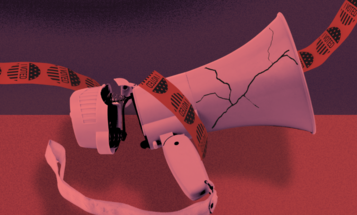
Saving Democracy Starts at Home, Mr. President
It’s time for America to lead by example and take action to repair our broken system. There is much work to do around the world, but for this country, saving democracy must start at home.

Tomorrow, the Biden-Harris administration will kick off its Democracy Summit, an effort to demonstrate the White House’s self-described “commitment to putting democracy and human rights at the heart of U.S. foreign policy.” Meanwhile, a new Texas law makes it harder for people with limited English proficiency and seniors with disabilities to get help at the polls. Florida law prohibits local and state officials from providing a mail-in ballot unless a voter specifically requests one. And in my home state of Georgia, counties now can decide not to allow early voting on Sundays—a conspicuous attack on Black churches’ “souls to the polls” tradition of voting after services.
Dozens of laws passed since the 2020 election are aimed at making it harder for millions of Americans to vote.
This kind of voter suppression, unfortunately, isn’t isolated to these 3 states. Dozens of laws passed since the 2020 election are aimed at making it harder for millions of Americans to vote. From laws reducing polling place availability to laws that eliminate mail ballot drop boxes, voters in this country simply face too many barriers to making their voices heard. While the notion of advancing democracy around the world is noble, America’s democracy is in a state of emergency and demands our attention and focus just as urgently. We must put our oxygen mask on first and then extend help to our neighbors.
The president took a major step forward in signing an executive order to facilitate voter registration earlier this year, but there is still much to be done to ensure everyone who is eligible to vote can do so. Here are three ways in which the United States can strengthen its democracy right now:
1. Once and for all, put people over politics and kill the filibuster.
This antiquated, Jim Crow-era rule requires a supermajority of 60 votes in order for legislation to advance in the Senate. Even if a majority of senators—by definition, 51—support a bill, the measure can’t pass unless 9 more of their colleagues support it. This means a minority of senators—who represent a minority of the American population—have an unfair amount of influence in government, and ultimately, they make choices that help them politically but hurt the rest of us. Popular bills that would strengthen our democracy, like the Freedom to Vote Act and the John R. Lewis Voting Rights Advancement Act, still aren’t law simply because of this irrational rule.
In addition to blocking voting rights reform, the filibuster stands in the way of D.C. statehood, gun reform, health care reform, and the George Floyd Justice in Policing Act—legislation that has strong support among the American people and would have significant impact in Black and brown communities.
It’s purely undemocratic and cannot go on.
2. Pass the (wildly popular) Freedom to Vote Act, which would:
- Allow same-day registration and eliminate the requirement that voters register by an arbitrary deadline before Election Day;
- Promote small-donor public financing for congressional elections to make running for office easier for everyday Americans who lack access to wealthy donors; and
- Prevent unlawful voter purges by reforming the rules dictating how states maintain their voter rolls.
3. Pass the John R. Lewis Voting Rights Advancement Act, which would:
- Restore the Voting Rights Act of 1965 and ensure that Black and brown voters, among other historically disenfranchised voters, enjoy protections for their right to vote and to elect candidates of their choice;
- Enable the federal government to serve as a watchdog for democracy nationwide and guard against discriminatory state-level voting laws; and
- Make it easier for Native Americans on tribal lands, many of whom live far away from polling places and don’t have residential mailboxes where they can receive a mail-in ballot, to vote.
It’s time for America to lead by example and take action to repair our broken system. There is much work to do around the world, but for this country, saving democracy must start at home.




